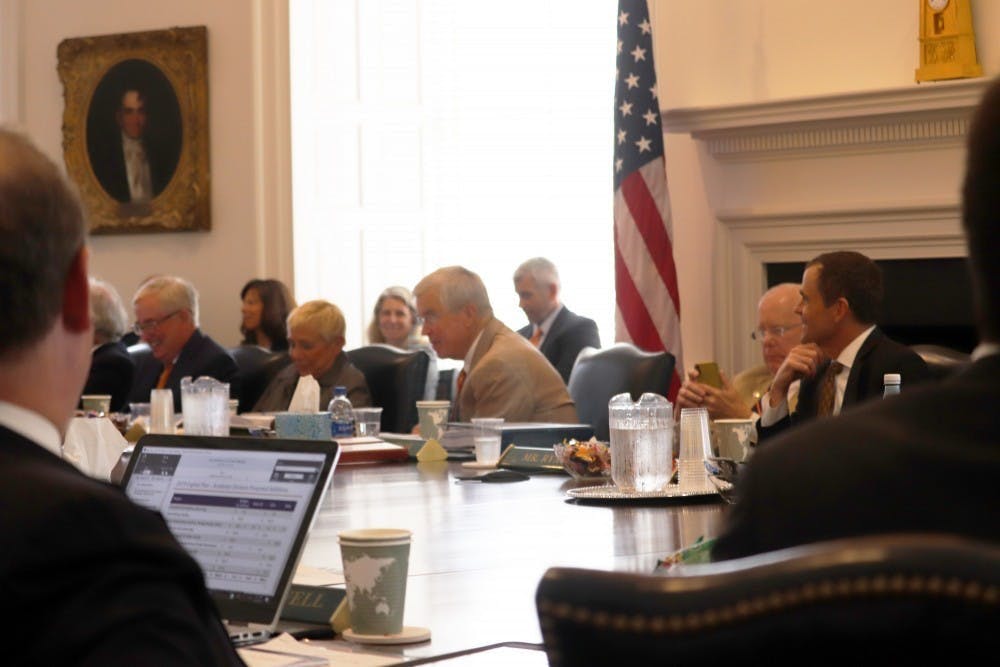I have never attended U.Va. I don’t know much about U.Va.’s culture, its students or its professors. But I understand Virginia political power, and I’ve been asked to write about how it intersects with U.Va.
The salient intersection is with the Board of Visitors, which principally consists of the Governor’s largest campaign donors. A study found that over nearly 20 years, just 3 percent of Board members had doctorate degrees but 91 percent made political contributions of over $1,000. There is no good reason why the faculty should survive sleepless dissertations, tenure reviews and other meritocratic gauntlets only to be overseen by a clique of political hacks.
It is a mistake to assume that the Board consists of the smartest or wealthiest business-people in Virginia — they are wealthy people, but they are a certain type who are willing to commodify their wealth and ask in return to be appointed to positions for which they are unqualified. There are exceptions, notably appointees to the two academic seats, but they are vastly outnumbered by entitled donors. The Board should not be but is the most political, most corrupt university board in Virginia.
The other intersection is part of the University’s two-tiered education system. The first tier is the meritocracy where the best and brightest are given a chance at the American dream. But at the undergraduate level at U.Va. and elsewhere, there is a second tier of education for what Paul Krugman calls “RDKs:” rich dumb kids. U.Va. is an outlier in its embrace of RDKs. The University has a lower percentage of undergraduates receiving Pell Grants than any Ivy League school in the country and many similarly situated public colleges. You get a leg up into U.Va. if you are wealthy and connected, but it is hard to be accepted from a poor county in Virginia.
As reported by The Cavalier Daily, the University devotes substantial public resources in the Office of the President to maintain a wealth-based affirmative action program to give children of the ultrawealthy an admissions boost. This operation is unique in the state. When similar programs were uncovered at the University of Illinois and University of Texas, those schools quickly launched internal investigations that led to the resignations of board members and presidents. Internal documents show that Board members and people like John Grisham personally use these lists. Clearly, the University does not want such an investigation because it knows exactly what it will find.
There is little that students can do to address these issues. The Board has an institutional memory stretching back decades, and it is easy for it to ignore rotating cohorts of students who will soon be gone. It is difficult but possible for organizations like Student Council and The Cavalier Daily to affect these issues at the margins. Smart activism can make a difference on smaller university problems.
The most important thing that students can do to make the world a better place was elucidated in a brilliant and insightful guest column in The Cavalier Daily by Anna Grace Calhoun. Students at U.Va. and elsewhere have been given freedom that few in American history have had — the freedom to make the most of their lives. This begets an imperative, existential question about what you should do with their careers.
It is hard to make this decision independently, so students often find themselves funneled into manicured pathways. Fifty years ago, it was easy to graduate and work for the military-industrial complex fighting the Vietnam War. When I graduated college, the clearest path was to the banks and hedge funds responsible for the nascent financial crisis — and now, you can work for climate change profiteers like Dominion, the most corrupt and destructive organization in Virginia. Dominion is Virginia’s largest corporate donor and Dominion Executive Vice President Robert Blue sits on the University’s Board.
A misconception fostered by those who benefit from it is that you will not have enough money if you work to help people and animals. I am 35 and can affirm that every peer I know working in public service after graduating from a top-30 university makes a very good living of at least the upper five figures per year, and many make six. Financial security is one benefit of a degree from a place like U.Va. You do not have to sell your soul to make money.
On the other hand, the people I know working in the manicured pathways make only slightly more money and are unfulfilled, less happy, less honest and less kind. Their life’s work is probably making the world a worse place. You cannot become part of a broken value system without it affecting who you are.
Helping others is a natural impulse that should be nurtured, but it is threatening to industries motivated by greed. Thus, they have to pay more to attract equal talent, and you see companies like Dominion advertising about solar panels on a plaque near the bookstore while cutting forests to build a 600-mile natural gas pipeline through our state.
One key to understanding the right thing to do with your careers is to look at what good people like University President Jim Ryan and others you may admire have done. What problems have they tried to fix?
There is more to life than soul-crushing sinecures, and there is so much in the world that is greater than ourselves. You should work to solve the problems that nobody else is solving.
Jeff Thomas is an author and researcher from Richmond, Virginia and is the author of The Virginia Way: Democracy and Power after 2016.







